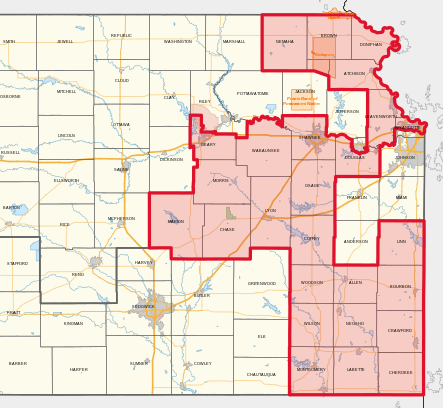The destruction of Johnson County’s 2020 general election ballots appears imminent, despite an ongoing sheriff’s investigation into the vote’s integrity and a citizen watchdog’s firm belief there was fraud.
Sheriff Calvin Hayden’s department has been battling over the ballots with the county commission, which last week voted to appoint bipartisan overseers for the ballots’ impending destruction at the urging of Secretary of State Scott Schwab and state law.

“We want to ensure you know we have an open criminal investigation concerning these past elections,” Hayden’s office wrote to the commission Dec. 5. “Potential evidence for this investigation should not be destroyed, especially prior to our review and examination of said evidence.”
The letter alerts the county that the sheriff’s office is awaiting data from a prior Los Angeles investigation into Chinese Communist Party ties to Konnech Inc.’s election software, and of Americans’ personal information being shared with China – some of which may be pertinent to Johnson County because it used Konnech.
Johnson County wrote in October 2022 that it found “no malicious activity” in the Konnech software called PollChief, used to manage poll worker information. Nonetheless, the county said it “transferred the PollChief election worker management system from Konnech Inc. to servers under Johnson County Government’s exclusive control.
“We added this extra layer of security at the local level to prevent unauthorized access to the software and our data.”
The county acknowledged that 825 of its 9,800 election workers’ records in PollChief “contained a driver’s license number, which is considered personal identifying information under Kansas statute.”
The county further sought to assuage citizen concerns about the Konnech connection:
“It is not and has never been connected to the county’s voting machines or any vote tabulation, voter registration, financial or any county systems. The Johnson County contract does not use the full functionality of the software and does not include payroll.”
But local citizen watchdog Thad Snider, who has made himself unusually conversant in election issues, compares that to having a “peeing section” in a public pool, which he said is meaningless.
“The software was stored in the Microsoft Azure Cloud,” Snider tells The Heartlander. “The Microsoft Azure Cloud was hacked recently by the [Communist Party of China].”

Indeed, an article in a tech publication earlier this year called Microsoft out for its “grossly irresponsible” security practices with Azure.
But why is it essential to preserve the actual ballots, rather than digital copies of them? First, Snider contends state law requires it – that actual ballots, not images, must be used in official audits and recounts of elections – and he alleges Johnson County failed to do that.
In addition, he says, oddly enough there can be differences between the actual ballots and digital images of them. He cites the August 2022 election in which Cherokee County, Kansas, officials said a faulty thumb drive flipped the results of a county commission race.
The flipped race was chalked up to “improper programming” on the thumb drive – and, Snider says, was corrected only by a hand count of actual ballots.
Auditing elections with digital images rather than actual ballots, Snider says, is merely “having the machine audit the machine.”
The sheriff did not return repeated messages from The Heartlander. But Kansas Republican Chairman Mike Brown is highly concerned that the ballots not be destroyed before the sheriff’s investigation is over.
“I am always concerned about any evidence in any investigation being destroyed,” Brown wrote in a statement to The Heartlander. “Holding onto the ballots in no way causes a hardship or expense to any involved party. With no stated reason for proceeding, it is curious why the Kansas Secretary of State, the Johnson County Commission, and the Johnson County Election Commissioner seem to be in a hurry to destroy the paper ballots.
“This evidence must be preserved until the entire investigation has concluded and charges, if any, are played out in a court of law.”
Snider, arguing that the previous Kansas attorney general, Derek Schmidt, issued a stay of the ballots’ destruction pending the sheriff’s investigation, likewise says, “It seems odd that they’re pushing for these to be destroyed in the face of an active investigation, and not just cooperating and letting him see them.”
The Heartlander asked a county spokesperson if the county will indeed destroy the ballots while the sheriff’s investigation is still going on and charges are still possible. The county referred all questions to the Secretary of State, saying, “Since the time for civil litigation and election contests has expired and there is no search warrant issued, determination of destruction of ballots is within the Secretary of State’s authority.”
The Heartlander asked a Secretary of State spokesperson what the secretary’s current position is on the ballots, and what he has communicated, or will communicate, to the election commissioner in Johnson County.
“The Sheriff has not communicated with our office regarding ballot destruction,” the spokesperson wrote in a statement. “KSA 25-2708(b) mandates destruction of ballots after a set period of time. This has been the law since 1893. We are not aware of any litigation hold or other legal action that would prohibit the county from complying with the law and destroying the ballots.”
Snider says he participated in Johnson County’s post-election audit in August 2022, in which he said “photocopies of digital images“ were used rather than actual ballots. “Statute is very clear that is not what you’re supposed to do,” he says.
The Secretary of State’s office disagrees, and in fact issued a rule in 2019 expressly allowing for images to be used.
When asked how an image of a ballot could be different from the ballot itself, Snider argues “the digital images can be manipulated.” And he points again to the Cherokee race that was changed by a thumb drive.
“Now, anybody who knows computers knows computers only do what they’re programmed to do. … There was never any investigation into [Cherokee County].”
Snider acknowledges voter fraud is “a tough legal bar to overcome when you’re talking about from a legal standpoint.” But, he adds, “Do I believe there was fraud? Absolutely.” Besides the Cherokee result and his other security concerns, he notes a suspiciously big 11-point swing in the county’s presidential vote from Donald Trump in 2016 to Joe Biden in 2020.
Snider says he’s conveyed his research on the local election to some of those affiliated with Trump, in the hopes that his team will subpoena and thereby preserve the county’s ballots as part of the former president’s defense in his Jan. 6 indictment.

Michael Ryan – The Heartlander
Michael Ryan is Executive Editor of The Heartlander. A Kansas City native, he's been an award-winning reporter, editor and opinion writer at newspapers in Kansas, Missouri, Georgia and Texas. See more at www.heartlandernews.com




